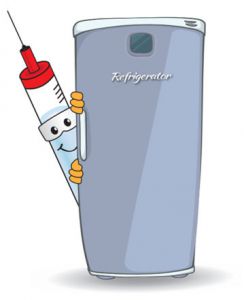Improper storage and equipment maintenance can reduce vaccine effectiveness and cost thousands of dollars in wasted vaccines. Equipment maintenance is an important part of managing your practice’s vaccine program.
The CDC has some helpful tips on vaccine storage equipment maintenance:
- Check storage unit door seals regularly for signs of wear and tear.
- Check door hinges and adjust so that the door opens and closes smoothly and fits squarely against the body of the unit. Leaving the door open can cause the thermostat to respond to warmer room temperatures, and the unit will work harder to maintain the correct temperature inside. The temperature may become very cold in some parts of the unit. Using an open-door alarm and a self-closing door may be helpful.
- Clean unit coils and motor per manufacturer instructions.
- Clean inside of units to discourage bacterial and fungal growth. Cleaning must be done quickly to minimize the risk of the temperature going out of range.
- Defrost manual-defrost freezers when the frost exceeds either 1 cm or per the manufacturer’s suggested limit. Follow the manufacturer’s instructions. While defrosting, store vaccines temporarily in another unit with appropriate freezer temperatures.
- Temperature monitoring devices experience “drift” over time that affects accuracy. If calibration testing indicates the device is no longer accurate within +/-0.5°C (+/-1°F), it should be replaced. Adjustments to correct accuracy are not recommended.
- Storage unit temperatures may need to be adjusted over time. Temperature adjustments should only be made by a vaccine coordinator and not during a busy part of the workday when the door is being frequently opened. The coordinator should confirm there is not another issue (e.g., unit unplugged, door left open, broken TMD, etc.) before making any adjustment to the temperature.
- If you believe there could be an issue with the TMD, use the backup TMD to confirm the temperature before making any adjustments.
- If a backup generator is used, it should be tested quarterly and serviced annually, and according to the manufacturer’s guidance.
CPP has educational resources around proper vaccine storage as well as a Vaccine Storage Equipment Educational Grant to help offset the cost of investing in proper storage equipment for your practice. Contact our office for more information.
